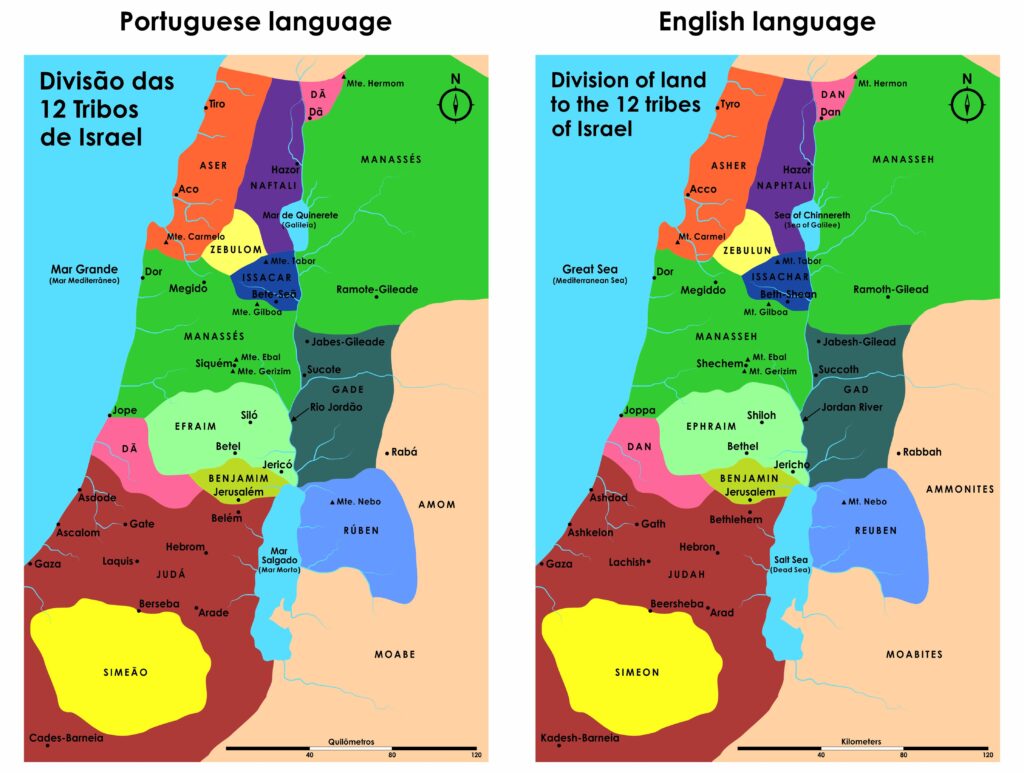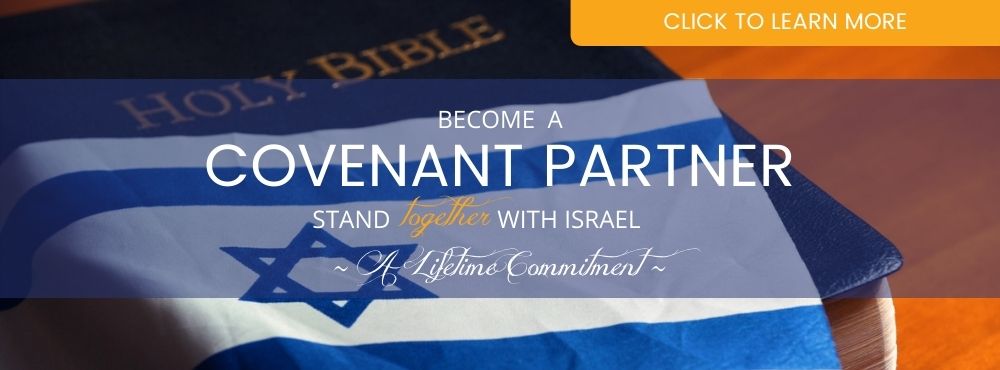The 12 Tribes of Israel | Covenant Promise of Land
Table of contents
God’s Word speaks frequently about the 12 Tribes of Israel and about the land promised to them. Yet, how did this promise come to be? How was the land
divided among the tribes? What portions were given? And were the portions of equal size?
Join us as we not only explore the 12 Tribes of Israel, but also learn how each received a portion of blessing!
The Covenant Promise Made with Abraham
Even before there were the 12 Tribes, a covenant promise was made during the time of Abraham. While Abraham is often called ‘father Abraham,’ as God made Abraham the father of many nations, Abraham was also the great-grandfather of those men who formed the tribes.*
Some of the major promises God gave in His covenant with Abraham include:
- The promise of many offspring from Abraham—beyond what man can count
- The promise of authority—of kingships
- The promise of it being an everlasting covenant—both unbreakable and binding
- The promise of land—what we know as the Promised Land
“As for Me, behold, My covenant is with you, and you shall be a father of many nations. No longer shall your name be called Abram, but your name shall be Abraham; for I have made you a father of many nations. I will make you exceedingly fruitful; and I will make nations of you, and kings shall come from you. And I will establish My covenant between Me and you and your descendants after you in their generations, for an everlasting covenant, to be God to you and your descendants after you. Also I give to you and your descendants after you the land in which you are a stranger, all the land of Canaan, as an everlasting possession; and I will be their God.”
—Genesis 17:4-8
In these covenant promises, each of the twelve tribes of Israel would be entitled to live in the Promised Land… but not until many generations had passed, including a period of slavery and wilderness wandering!
* Abraham was also the great-great-grandfather to the two half-tribes known as Manasseh and Ephraim, the sons of Joseph, who are sometimes spoken of as individual tribes, and other times listed under the name of their father.
Portions of Land Given to Each of the 12 Tribes of Israel
We know of the promises set down in the covenant with Abraham, and that Abraham’s descendants—the 12 Tribes in particular—would come to enter the Promised Land. But where did the tribes reside within that Promised Land?
As we look at the portions of land given to each tribe, it is important for us to remember that modern day Israel is smaller than the land promised by God. Further, not every tribe continued to take the land promised by God; some chose to settle for only a portion of their promise, and at least one tribe entered land other than what God had prepared for them.
So, what portion did each tribe receive?
From north to south, the tribes were given these areas of land:
- Asher – farthest north and to the west, bordering the Mediterranean Sea
- Naphtali – also in the north, just east of Asher
- Zebulun – between Asher and Naphtali, near their more southern borders
- Issachar – southeast of Zebulun
- Manasseh – south of Issachar and ranging from the Mediterranean Sea in the west, going north past the other tribes, to the east of Naphtali
- Gad – on the southern and eastern borders of Manasseh
- Ephraim – west of Gad
- Dan – west of Ephraim and bordering the Mediterranean Sea
- Benjamin – east of Dan and surrounded by Ephraim, Gad, Judah, and a small portion of Ruben
- Rueben – southeast of Benjamin and directly below Gad
- Judah – east of Reuben and going far into the south, whose land included Jerusalem
- Simeon – lying within the borders of Judah
- Levi – given cities and priestly duties within the land of the other tribes and therefore, had no land of their own
Of these, Judah and Manasseh have the largest portions of land. But why is that? And how were the areas chosen for each tribe?
How the Promised Land Was Divided Among the 12 Tribes
There were two means by which division of the Promised Land was decided. One involved the population of the tribes. The other involved the casting of lots to determine God’s choice.
There is some confusion as to if both were used, as some view the two as contradictory… however, a combination of the two is not improbable. Suppose, for instance, that the population gave a starting place where the general size of land portion could be determined… but the lot allowed God to refine it—as God knows future needs, prophetic significance, etc.**
** This is in no way a claim as to how events actually took place. Instead, it is used to demonstrate how the two forms of division need not be mutually exclusive.

Though we cannot know for certain how the division was accomplished, we can explore two tribes to better understand how population and land were or were not ultimately connected… and how God’s hand is seen in it…
Judah was the largest of the tribes in terms of population and certainly they received a portion that aligned with their current need and also allowed for their then unknown future needs.
Needs that would relate to all of the amazing things God would do in and through the tribe of Judah…
After all, Judah was the tribe God chose to later use as a kingly lineage and part of the lineage of Jesus. Further, God chose Jerusalem as the kingly city and the place upon which He would write His Name. In these points alone we can see God’s design in the size AND location given to the tribe of Judah.
Manasseh, however, which received a very large portion of the Promised Land, was not the largest in population—though Manasseh was among the top five. But why is this? There is a certain boldness and determination to receive inheritance amongst the tribe.
Consider the five daughters of Zelophehad, from the tribe of Manasseh. When their father died, they went before the leaders to contend for an inheritance within the Promised Land and to have their father’s name remembered—an inheritance which, at that time, was not automatically theirs because of their gender and lack of brothers. But because they contended for their inheritance, God told Moses that the women were correct and that they—and daughters found in similar situations—should receive an inheritance…
This boldness to contend for God’s promises was not limited to these five women of Manasseh. It was present within the whole tribe who went in and possessed the land with great fervor!
Thus, we see that while population played a role in the size and division of the land, God’s decision, based on His knowledge of the future and of the people’s character, played a key and deciding role.
The 12 Tribes of Israel Today
Today, few of those descended from the 12 Tribes of Israel can trace their lineage back far enough to know which tribe they are from. Exceptions exist, but typically, those who know are among the priestly lineage of Levi…
One reason for this may relate to the rebuilding of the Temple, as knowledge of who is the current High Priest, or who is viewed as sanctified for other Temple duties, would be considered by some to be as essential as possessing the ark of the covenant.
Yet, while knowledge of who belongs to which tribe has largely been lost to man… it has not been lost to God. God provides us with specific numbers for those tribes mentioned in Revelation—Dan and Manasseh are absent, though Joseph, who typically is only added when Manasseh AND Ephraim are not mentioned, is included. Further, the covenant promises He made with Abraham and Abraham’s descendants—the 12 Tribes included—has not been cut off!
Yes, we have been grafted into that covenant—a beautiful blessing—but all of the blessings and promises of that covenant still belong to the Jewish people. The descendants of the 12 Tribes of Israel.
At this point in time, portions of the Promised Land are not in the hands of Israel. And of the portions currently in their possession, the tribes living in the land presently share… both because not everyone knows their personal tribe, and because, with the land smaller than the full Promised Land, not every tribe would have access to their portion.
Yet even now God is blessing the nation of Israel. The land—even the desert—is bringing forth new life! The people are blossoming—with descendants of the tribes from around the world returning to the covenant promise!
God is not finished blessing His people. Because God does not lie. He does not go back on His Word. Our God is a covenant keeping God! He has and will continue to fulfill His covenant promises to Israel, and to us!
“I will bless those who bless you, and I will curse him who curses you; and in you all the families of the earth shall be blessed.”
—Genesis 12:3
